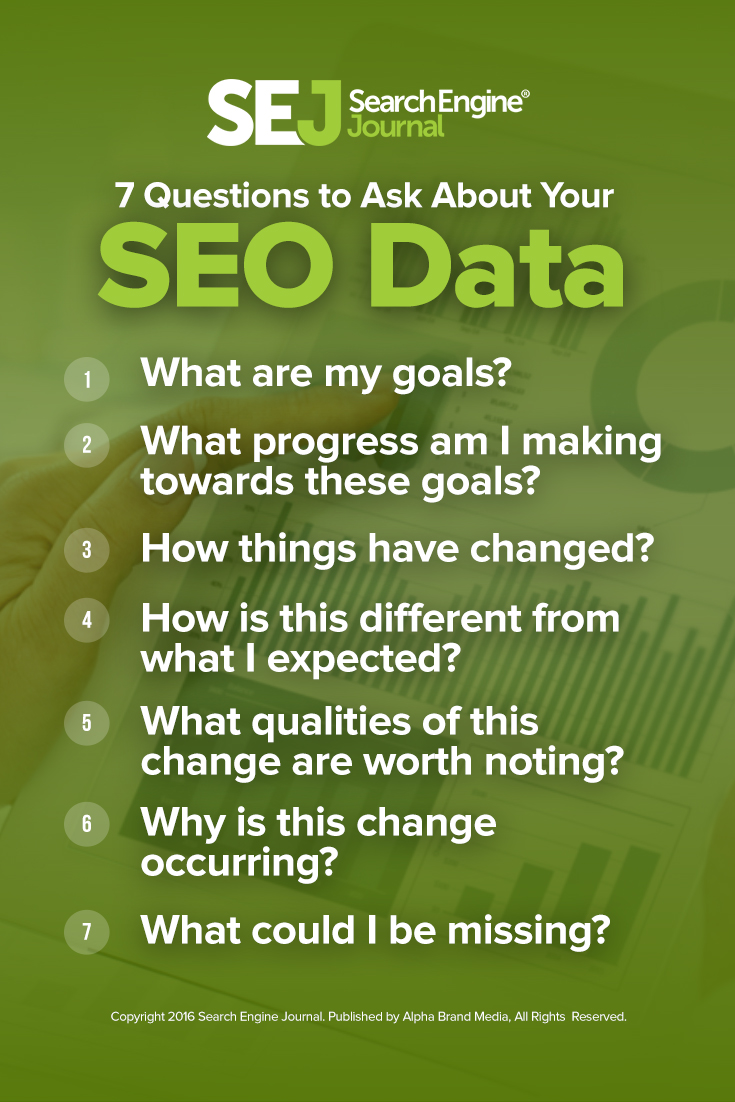We live in a glorious age of data, and if you’re like most marketers, you relish in it. Yes, the massive influx of data can be stressful, and at times, intimidating, but at least you have objective data on what’s going on in your campaign on all fronts—right?
SEO is a strategy that depends on objective data reporting and analysis to be effective; if you don’t listen to the data when it tells you you’re doing something wrong, you could self-destruct. On the other hand, if you analyze the data correctly, you’ll all but guarantee yourself a solid path forward.
 Google Analytics and hundreds of other fantastic online analytics platforms can give you more data than you ever thought you needed—but therein lies the problem with modern data analysis. Objective data alone can’t give you meaningful takeaways and conclusions. For those, you need to ask the right questions of your data:
Google Analytics and hundreds of other fantastic online analytics platforms can give you more data than you ever thought you needed—but therein lies the problem with modern data analysis. Objective data alone can’t give you meaningful takeaways and conclusions. For those, you need to ask the right questions of your data:
- What are my goals? You should be familiar with your goals in a general sense, but it pays to remind yourself what your actual, specific goals really are. Are you trying to get more conversions? Are you focused exclusively on traffic? What kind of traffic growth were you hoping for? What kind of time frame were you looking at? This will help you identify the key areas and plan what you need to measure to evaluate your progress.
- What progress am I making toward these goals? Take a look at how the numbers illustrate your progress toward your goal. For example, let’s say you’re hoping for a 50 percent increase in organic traffic in the first six months of the year. After the first month, how much of a traffic increase have you seen? This is a basic question, but it’s one that’s often missed—people tend to look at their “progress” data without putting it into the context of their ultimate goals.
- How have things changed? Here, you’ll want to look at a variety of other data points. Look for outliers and changes that break from the norms you’re used to. For example, let’s say your bounce rate suddenly spikes, or one of your internal pages becomes more popular—this is important information that could tell you about how one of your recent changes is affecting your user behavior.
- How is this different from what I expected? It’s important to clarify the difference between your actual results and your expected results, as this can help you better understand your SEO strategy in general. It forces you to challenge your assumptions and accept the fact that your ideas of SEO growth may be wrong—which most marketers are afraid to admit. For example, let’s say you recently launched a new social media campaign, but your social traffic didn’t grow as much as you thought it would. Why is this?
- What qualities of this change are worth noting? Dig a little deeper into the major changes in your report to understand the secondary qualities that may be worth further consideration. For example, let’s say you’ve seen a major increase in organic traffic from one month to the next. What demographics are a part of this organic increase? What pages are they going to first? Is their behavior any different from past segments of your population?
- Why is this change occurring? It’s hard to pinpoint the exact motivation for a change in an SEO campaign, but it’s important that you try. You can’t just assume that the first factor that pops into your mind was responsible—for example, if you launch a new wing of your content strategy and see a rise in organic traffic, you’d immediately think your content strategy was responsible. It may be, but take a look at other variables to to isolate the real root cause.
- What could I be missing? This is a big question, and one that’s hard to answer, but it’s an important way of challenging yourself. Revisiting your SEO strategy on a regular basis will help. Think about all the data points, all the variables, and all the possible changes you could potentially be missing. You should be excited to find out you’re wrong about something—it means you have the chance to improve.
These are just a handful of the most important questions you’ll have to ask your data. I kept these questions open-ended and ambiguous, so they can apply to practically any business, but in reality, they should be as specific as possible.
Narrow your focus as tightly as you can to avoid misleading yourself with internal biases or vagueness. Once you start asking the right questions, you can start forming more meaningful, actionable conclusions.
The final question, once you’ve learned all you can learn from your most recent report, is “How can we improve from here?”
 Image Credits
Image Credits
Featured Image: Hilch/Shutterstock.com
In-post Photo: alexskopje/Shutterstock.com





